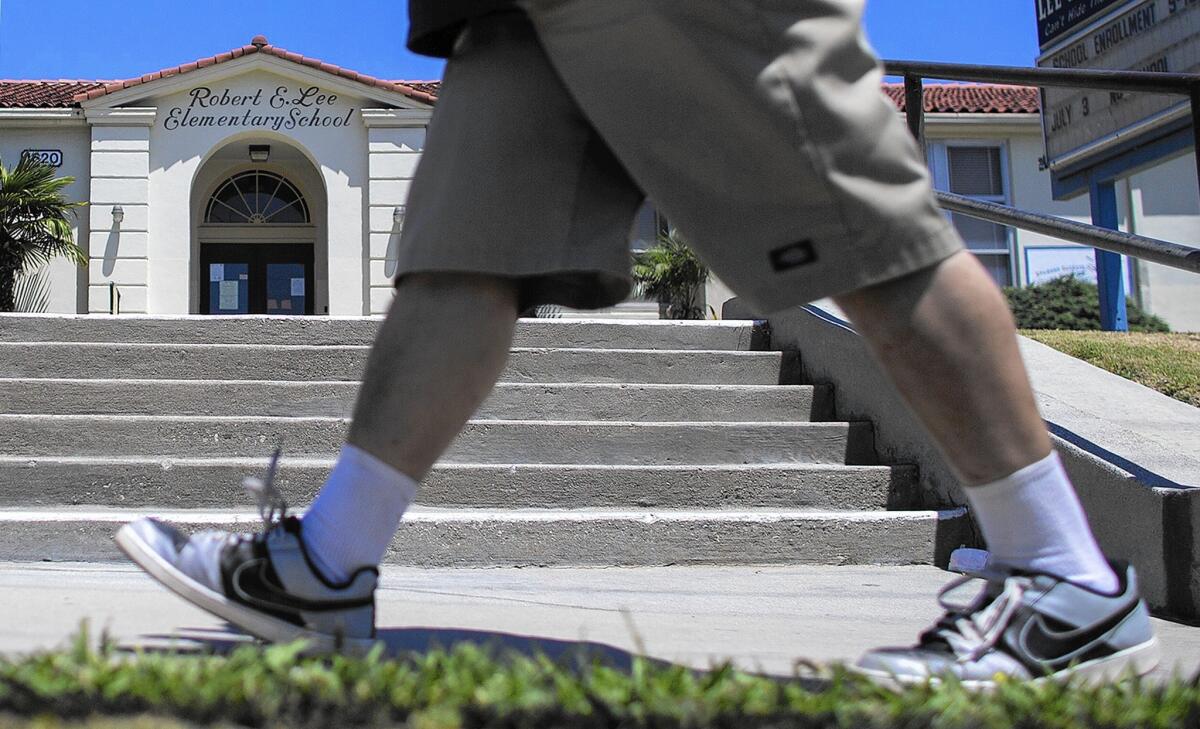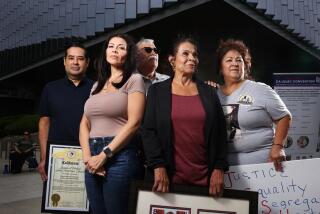There’s more to battling racism than removing Confederate names and symbols

- Share via
I don’t want to take a stand that lands me on the side of racists and fans of the Confederacy. But I can’t support the push by civil rights activists and Sacramento politicians to force a Long Beach elementary school to erase Robert E. Lee from its name.
I get the point: California shouldn’t honor the general who led Rebel forces in a war that aimed to split our country and sanctify slavery.
I know the timing’s right. The massacre of nine black worshipers in a South Carolina church has forced us —finally — to reckon with the Confederate era’s ugly legacy.
But this strikes me as the sort of grandstanding that squanders an opportunity for our own reckoning.
It’s easy to look down our noses at once-backward Southern states, but California’s history is far from squeaky clean on matters of race. We need to acknowledge that, not turn it into a publicity grab.
It’s hard to be against something labeled the Frederick Douglass Liberty Act, as the Sacramento proposal is called. It forbids “the use of a name associated with the Confederate States of America” on any state or local government property. Any building that violates that, like Robert E. Lee Elementary, would have two years to decide on something else.
I think that smacks of treating the symptom and ignoring the disease.
It’s a great political tactic. An easy way to raise your profile if you’re a legislative newbie like state Sen. Steve Glazer (D-Orinda), who introduced the measure. A smart way to help reshape your party’s image if you’re a Republican like co-sponsor and Senate Minority Leader Bob Huff (R-San Dimas).
If only eliminating the residue of racism were as easy as painting over a name or taking down a sign.
::
There’s no accounting yet of how many schools, parks, monuments or government buildings might be forced to comply. There are at least two Robert E. Lee campuses in Southern California, in Long Beach and San Diego.
The Long Beach school is one of the city’s oldest. It opened in 1898, although historical accounts aren’t clear about how and when it was named after the Confederate hero.
For as long as most folks can remember, it’s gone without the “Robert E.” The general’s name is inscribed over its entrance, but the school’s marquee, website and T-shirts, as well as school district references, all call it “Lee Elementary.”
It’s an award-winning elementary school in a district known nationally for creative leadership and progressive reforms. It’s also a model of the kind of diversity that would have Gen. Lee rolling over in his grave.
The student body is a mix of Latino, black and Asian American children. More than 95%, according to district statistics, come from low-income families and more than half are still learning English. Yet the school’s academic performance, measured by state tests, far eclipses similar campuses in other districts.
The school motto? “Can’t hide that Lion pride.”
The taint of their school’s moniker doesn’t seem to bother students. That’s because what goes on in the classroom matters more than what’s written on the door.
If lawmakers really want to send a message about combating racism, they should make sure that every child and all our schools have the resources they need.
::
Banishing the Confederate flag is the right thing to do. It’s a symbol of official fealty to noxious principles that denied the humanity of millions of Americans. Last year, California legislators mandated its disappearance.
But preoccupation with optics also can stall our progress.
The current push to banish all references to the Confederacy feels like a waste of energy at a time when structural impediments are the primary enemies of equality.
Several local civil rights groups have joined the campaign to force the Long Beach school district to change the name of Robert E. Lee Elementary. But a weeklong online petition drive netted fewer than 200 signatures.
Earl Ofari Hutchinson, head of the Los Angeles Urban Policy Roundtable, said he expects the Long Beach school board to take up the issue and host a public discussion later this summer.
“Schools are named and renamed all the time,” he said. “To say we’re stuck with something that happened 100 years ago and it’s got to be that way … that’s a dangerous mind-set.”
It’s hard to believe, Hutchinson said, that California schools named for a Confederate hero didn’t raise alarms until now: “How and why could this happen in our own backyard? We’re not Texas or Louisiana or Alabama.”
But it’s also dangerous to scrub our history of its unpleasantries.
Confederate relics remind us that star-bright California has had its dark days too. Instead of editing out the bad guys and blurring history, we ought to explain to our children the conflict and change that shaped our country and our state — change we are still going through.
Maybe that will help them understand why hauling down those Confederate flags is such a big deal.
Twitter: @SandyBanksLAT
More to Read
Sign up for Essential California
The most important California stories and recommendations in your inbox every morning.
You may occasionally receive promotional content from the Los Angeles Times.














